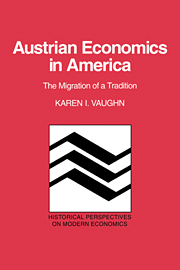Crossref Citations
This Book has been
cited by the following publications. This list is generated based on data provided by Crossref.
Vaughn, Karen I.
1993.
Why Teach the History of Economics?.
Journal of the History of Economic Thought,
Vol. 15,
Issue. 2,
p.
174.
Moss, Laurence S.
1995.
Finding New Wine In Old Bottles: What Historians Must Do When Leontief Coefficients are no Longer the Designated Drivers of Economics.
Journal of the History of Economic Thought,
Vol. 17,
Issue. 2,
p.
179.
Horwitz, Steven
1996.
Keynes on capitalism: Reply to Hill.
Critical Review,
Vol. 10,
Issue. 3,
p.
353.
Hutchison, Terence
1996.
On the relations between philosophy and economics.
Journal of Economic Methodology,
Vol. 3,
Issue. 2,
p.
187.
Zappia, Carlo
1996.
The notion of private information in a modern perspective: a reappraisal of Hayek's contribution.
The European Journal of the History of Economic Thought,
Vol. 3,
Issue. 1,
p.
107.
Lewin, Peter
1997.
Hayekian equilibrium and change.
Journal of Economic Methodology,
Vol. 4,
Issue. 2,
p.
245.
Boettke, Peter J.
1997.
Where did economics go wrong? Modern economics as a flight from reality.
Critical Review,
Vol. 11,
Issue. 1,
p.
11.
Butos, William N.
and
Koppl, Roger G.
1997.
The Varieties of Subjectivism: Keynes and Hayek on Expectations.
History of Political Economy,
Vol. 29,
Issue. 2,
p.
327.
Prychitko, David L.
1997.
Expanding the Anarchist Range: a critical reappraisal of Rothbard's contribution to the contemporary theory of anarchism.
Review of Political Economy,
Vol. 9,
Issue. 4,
p.
433.
Sciabarra, Chris Matthew
1998.
Are we all dialecticians now? Reply to MacGregor and Friedman.
Critical Review,
Vol. 12,
Issue. 3,
p.
283.
Samuels, Warren J.
1998.
Murray Rothbard's Austrian perspective on the history of economic thought.
Critical Review,
Vol. 12,
Issue. 1-2,
p.
71.
Foss, Nicolai J.
1998.
Austrian and Post-Marshallian Economics: The Bridging Work of George Richardson.
SSRN Electronic Journal ,
Caplan, Bryan
1999.
The Austrian Search for Realistic Foundations.
Southern Economic Journal,
Vol. 65,
Issue. 4,
p.
823.
Palermo, Giulio
1999.
The Convergence of Austrian Economics and New Institutional Economics: Methodological Inconsistency and Political Motivations.
Journal of Economic Issues,
Vol. 33,
Issue. 2,
p.
277.
Block, Walter
1999.
Austrian theorizing: Recalling the foundations.
The Quarterly Journal of Austrian Economics,
Vol. 2,
Issue. 4,
p.
21.
Streit, Manfred E.
and
Wohlgemuth, Michael
2000.
The Theory of Capitalism in the German Economic Tradition.
p.
224.
Backhouse, Roger E.
2000.
Progress in Heterodox Economics.
Journal of the History of Economic Thought,
Vol. 22,
Issue. 2,
p.
149.
Basili, Marcello
and
Zappia, Carlo
2000.
Radical Ignorance in Individual Decision Making: Assessing Austrian Subjectivism.
SSRN Electronic Journal,
Caldwell, Bruce
2000.
Allen Oakley, The Revival of Modern Austrian Economics: A Critical Assessment of Its Subjectivist Origins (Cheltenham: Edward Elgar, 1999) pp. xi, 213, $90. ISBN 1-85898-540-4..
Journal of the History of Economic Thought,
Vol. 22,
Issue. 3,
p.
392.
Backhouse, Roger E.
2000.
Austrian economics and the mainstream: View from the boundary.
The Quarterly Journal of Austrian Economics,
Vol. 3,
Issue. 2,
p.
31.





